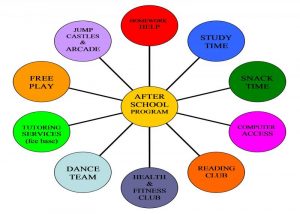 In an article posted in Family Education, more than 14 million students leave school and have nowhere to go because of a lack of affordable after school opportunities.
In an article posted in Family Education, more than 14 million students leave school and have nowhere to go because of a lack of affordable after school opportunities.
A report from the Department of Justice in 1997 states that 29% of all juvenile offenses occur on school days between 2 and 8 p.m. Since then opportunities arose for after school programs. More parents than ever work outside the home and need the assurance of a good after school program to take up the slack from the time children leave school to the time parents return home from work.
According the National Association of Elementary School Principals, 2001, educators believe that it is extremely important to start and maintain extended-day programs to meet the needs of the school community.
Programs held during after school hours benefit students socially, personally, academically and some even engage students in physical activities. They keep children safe and supervised.
 Today public schools are taking the time to develop after school programs to help students with homework and other academic needs. Several benefits from school reports indicate:
Today public schools are taking the time to develop after school programs to help students with homework and other academic needs. Several benefits from school reports indicate:
• LA’s Best program reported 20 percent of the students attended were less likely to drop out of school than the nonparticipants. According to the UCLA National Center for Research on Evaluation, Standards and Student Testing, September 2007, the LA’s Best Afterschool program, 30% of the participants are less likely to participate in criminal activities.
• Chicago’s After School Matters program claim higher graduation rates.
• New Hampshire schools found that more the half of regular attendees improved both behaviorally and academically.
• North Carolina’ Young Scholars Program averaged double-digit increases annually for proficiency in reading and math and promotion rates rose by 38%. The Ada Jenkins Center in the Lake Norman area offers the LEARNWorks after school program that serves 85% impoverished and at-risk students in the elementary grades. They report 100% participants promoted to the next grade level, 95% of students met their academic goal for the year, 98% stated they were learning to become leaders, and 100% surveyed parents stated satisfaction with staff communication and academic growth.
• St. Paul Minnesota’s 21st CCLC Pathways to Progress reported better grades in English and math than the nonparticipants.
• Maryland’s After School Opportunity Fund Program revealed that participants had a positive gain on measures of commitment to education and academics as well as a decrease in delinquency.
 After school programs are successful and provide a safe haven for our children. If you want to find out about after school programs offered in your area, consult your child’s teacher, counselor, or principal for the most beneficial program. Find one that fits the child’s needs and interests. Consult a teacher as to whether the child needs a slower paced program or a program that will enhance a talent. Ask questions:
After school programs are successful and provide a safe haven for our children. If you want to find out about after school programs offered in your area, consult your child’s teacher, counselor, or principal for the most beneficial program. Find one that fits the child’s needs and interests. Consult a teacher as to whether the child needs a slower paced program or a program that will enhance a talent. Ask questions:
• Is there a variety of activities for participation?
• Is it tailored to all ages and needs?
• Does it involve hands-on learning?
• Are there library resources and sports equipment?
• Is there communication between staff and parents?
• Is there an academic connection with the local school?
One of the challenges after school programs face is funding. Politicians, policy makers, and corporate donors need to be aware of the benefits and need for new programs especially in the lower income areas. After school programs develop critical traits that prepare our children for adulthood. It is of utmost importance that children have somewhere to go after the close of the school day. All children need to have equal opportunities to succeed in life.


